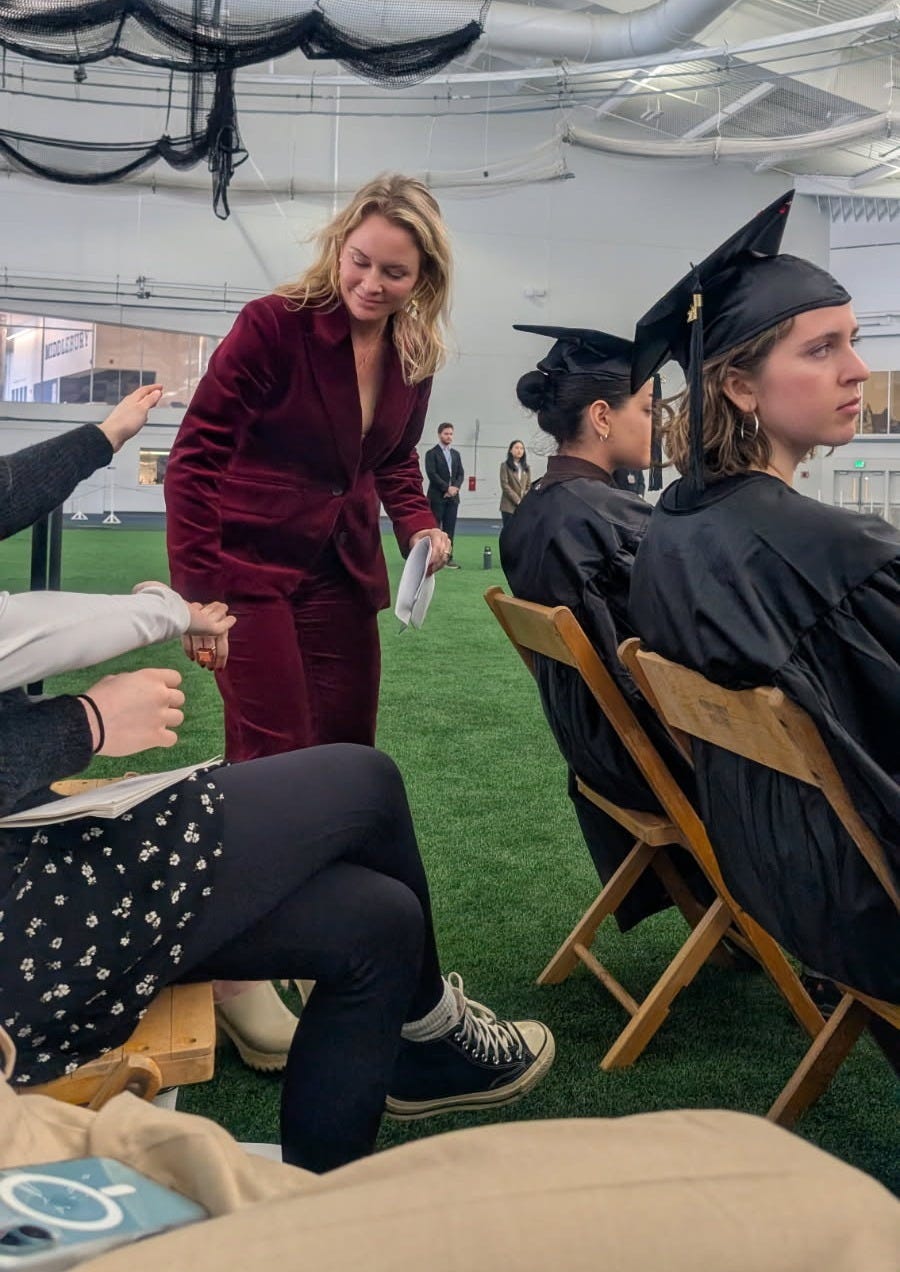A few weeks ago, I received a note letting me know that Middlebury’s February graduates had voted me in as their commencement speaker. I was honored.
I thought hard about what I thought the students both wanted and needed from me, and what I think this moment in time calls for. What do I wish people thought about as they join work and family systems? What do I believe a liberal arts education can do in the world? I landed on the value of civil and strategic disobedience. My words are below.
I think my favorite line is this: I would venture to say our preoccupation with safety and comfort no longer matches the stakes of the times in which we live.
*
In the “Danger of Wisdom” poet Jack Gilbert writes:
We learn to live without passion.
To be reasonable.
We are taught to be
Moderate, he says.
If you have written work for me in one of my classes, you know I want you to be anything but moderate. In fact, I would go so far as to say we risk poisoning ourselves with moderation. With our routine compliance and embrace of norms.
I would venture to say our preoccupation with safety and comfort no longer matches the stakes of the times in which we live: our forests and homes aflame, unsafe levels of carbon dioxide in the atmosphere, a culture obsessed with technology, power, and shareholder return over health and a livable planet.
You made it to a place like Middlebury by following rules. You learned how to succeed at academics and sports. You scored well on the SAT. You learned how to be “good.” These rules, whether spoken or unspoken, have shaped you, and will continue to shape you. As you walk into your new lives, you will again feel the weight of new rules: how a job is done, how you participate in work, family, and social systems.
But now you have a Middlebury education which has taught you to think critically, and how to think about beauty and justice.
Today I want to challenge you to think not about rules, but about disobedience. Strategic and compassionate disobedience. I want you to think about how you will take the privilege of this degree and put it to work to shape the world and the spaces in which you move.
In my life experience, almost every breakthrough, every leap forward, every move toward greater justice in the world I’ve seen has come from civil and strategic disobedience.
I’m not talking about reckless disobedience or the kind of empty protest that looks good on social media. I’m talking about the kind of disobedience that risks discomfort, rejection, disapproval. It risks breaking away from the paths that others have set out for you. The kind that requires you to have some skin in this game, to show that you have learned through your liberal arts education to think both critically and ethically.
We cannot move the needle of society forward - in service of others - by behaving. By being moderate, compliant, turning the other way. We move the needle forward through hard conversations, confrontation, and stepping out of line.
We can say things like: I feel differently. I cannot continue. I disagree. I need to break from tradition here. I demand change. We can say: I refuse to participate in harm.
Let me give you a small personal example of a time I should have pushed back. In 2019, I felt disillusioned with the noise of the Internet. I felt like I needed to have my hands in “real” work. I wanted to make a difference. So I started driving a Meals on Wheels route, just like my mother had done.
I don’t tell you this to be self-righteous; I could keep you here all day telling you the ways I fail my ideals.
Meal service is not glamorous work.There was a hoarder who lived in an upstairs apartment with a smell that still haunts me – she liked to try to answer the door naked. MEGAN I’M COMING BUT I’M NAKED she’d yell. I learned to drop the meals, shout pleasantries, and run.
There was dear Ed, a blind former security guard who waited for me at his kitchen table and always made me a slice of toast.
But it’s my first day on the job that haunts me. Early one winter morning I found myself in the home of an elderly man with a special-needs son. He was nervously watching over his wife, who was dying in a soiled bed in a corner of a dim room. The man - probably in his late eighties - asked me: could you help me change the sheets?
I froze.
The woman I was training with that day looked at me, with cool and steady professionalism in her eyes, and said, “We shouldn’t get involved.”
The truth is that part of me wanted her to say that, to absolve me from an action I found inconvenient, sad, dirty. An action which would have reduced suffering in a life which had no shortage of it.
We left the old man there with a few warm meals and moved on to the next house. Even though the world might have applauded me for “staying professional,” I still feel I made a mistake by refusing to help. I refused to step out of line. I prioritized compliance over my values. I was mild. I regret it.
Sometimes a code of conduct keeps us at a distance from real life. Rules keep us from honoring our intuition or challenging a trusted mentor, family member, boss, cultural institution or political party.
Sometimes disobedience is small, like speaking up in a meeting. Or saying - you know what, I can change those sheets. Let me help.
Sometimes it’s big, like Colin Kaeperneck kneeling, Bishop Marianne Budde asking a president for mercy, Vera English speaking out against GE’s radioactive spillage. It can look like Rachel Carson writing about the danger of pesticides or our very own Middlebury students seeking divestment, or enacting peaceful protests.
Some of my richest moments have happened on the other side of risk - when I stepped out of line, moved in a new direction.
It’s how I became a better writer—not by writing what was easy, but by writing fiction that terrified me, and journalism that put me at risk of litigation. It’s how I left the place I’d lived for 30 years, the South, to start anew. It’s how I became a working mother.
Let me leave you with a line from one of my favorite poets, Jane Hirshfield.
She says: “Open the window a few inches wider than is comfortable.”
This idea is about widening the aperture of your life—training yourself to see the world, and yourself as a participant in systems, with new eyes.Thinking for yourself. Thinking about the suffering of others. Making new and independent decisions.
So as you step forward into your own journey, I encourage you to step out of line. Listen to your intuition. Consider leaning in when the world tells you to pull away. Question your associates. Challenge profit and convention. Risk speaking up in a meeting if something feels wrong. Help a suffering stranger. Abandon your moderate stances once in a while. Because it’s only when you’re willing to disobey the small, safe codes that the real world starts to open up for you and most importantly, for others.
Thank you.
PS: I have one slot for a full manuscript consultation which just opened up. First come, first serve. $2500, an intake meeting, editorial letter, margin notes, and a walkthrough call.




Thank you for your care-full nuanced call to move out of our comfort zones. It is the call of our time and so badly needed. I am dreaming of a massive march on Washington this summer.
Beautiful, brave and true.